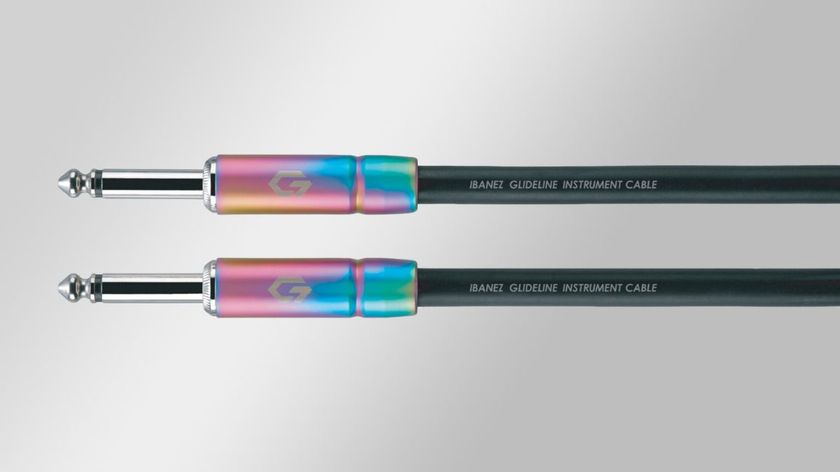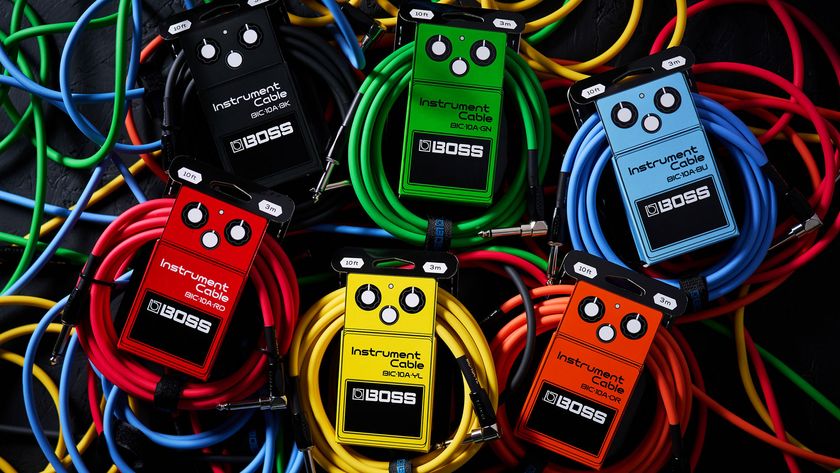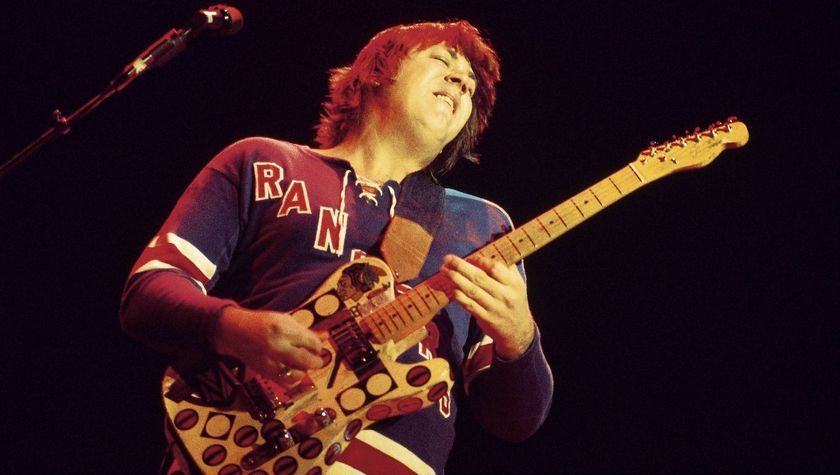Best guitar cables 2025: recommended instrument cables for electric, acoustic, and bass guitar
Plug in with confidence using our expert guide to the best instrument cables from, Mogami, Ernie Ball, George L’s, and more
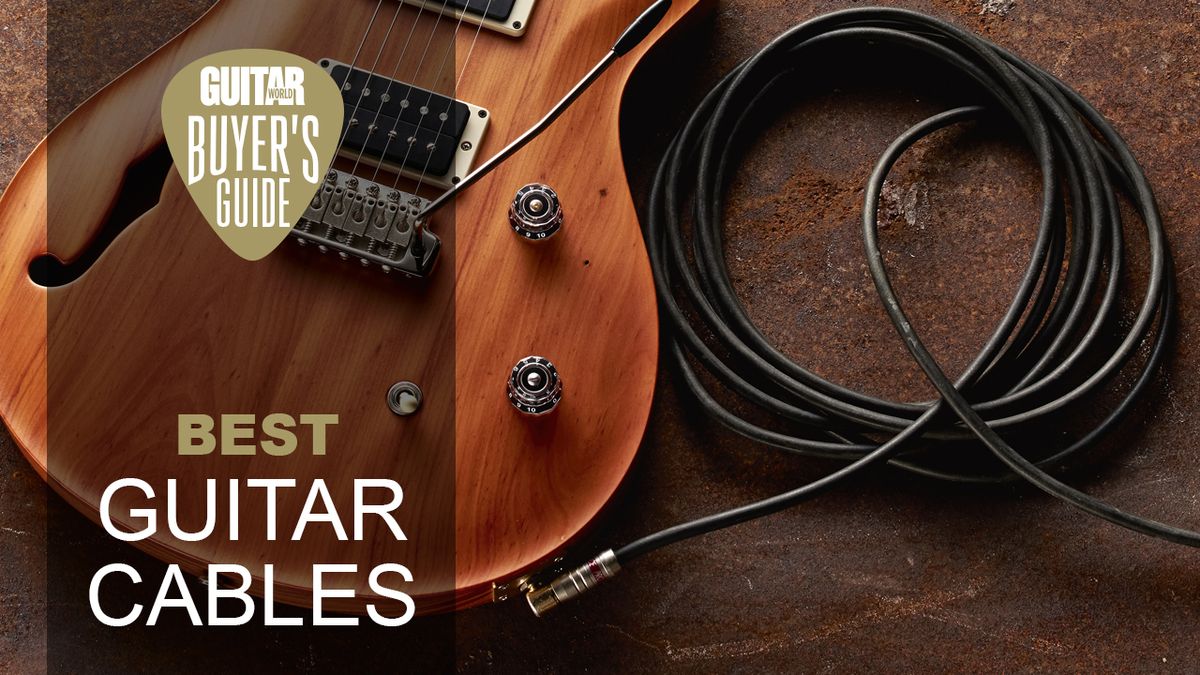
You've painstakingly put together your pedalboard, spent ages obsessing over the speakers in your amp, and cultivated a selection of guitars that can help you cover a variety of bases, but have you put as much thought into the thing that connects them all together? While we can admit it's not the most exciting thing, the best guitar cables are a must-have item for any serious guitar player.
Those cheap cables on Amazon may seem tempting but trust us, they're just waiting to introduce monophonic noise into your finely crafted guitar tone. Never mind the failure rate of the connectors on those things. Upgrading your guitar cable not only improves your tone, but also spares you the embarrassment of hunching over your pedalboard mid-set trying to find the offending cable that's failed. Trust us, we've been there.
If you want the very best of the best, then you should check out Mogami Gold guitar cables. They're by no means cheap, but there's a reason many pro guitarists swear by them. If those are a little out of your price range, you can still get great quality cables on a budget. Ernie Ball Braided cables deliver fantastic sound quality and durability, without you having to spend loads to get it.
We've tested countless cables over the years, whether it's playing at home, recording in pro studios, or touring with our bands. We've included some FAQs at the end of this guide, all answered by our team of expert writers so if you'd like to read more about the guitar cables before buying, it's worth checking out. If you just want to get straight to our product recommendations, then keep on scrolling.
Best overall
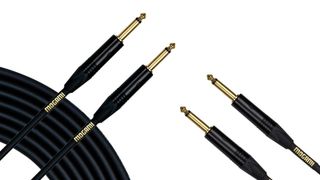
1. Mogami Gold Series guitar cable
Our expert review:
Specifications
Reasons to buy
Reasons to avoid
The Mogami Gold Series guitar cable has an ultra-high density (UHD) spiral shield and conductive polymer sub-shield to help kill noise and, in our experience, preserve that signal. A conductive carbon-impregnated PVC layer will stop all the sort of microphonic pop that you can get from handling cheaper guitar cables.
The copper core conductor might be heavy gauge but the Gold Series is still easy to handle and easy to pack away. Gigging musicians might wish to upgrade to the Gold Series Silent, which use Neutrik silent plugs so you can change your instrument without having to switch your amp off.
This cable comes with a “no excuses” lifetime warranty and is offered in a wide variety of lengths. Perhaps the Gold Series cable is a little OTT for some, but if you want premium quality, it doesn't get much better.
Best on a budget
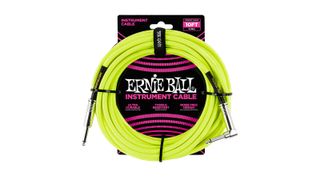
2. Ernie Ball Braided guitar cable
Our expert review:
Specifications
Reasons to buy
Reasons to avoid
All of Ernie Ball's guitar cables are built to last, but these braided models are designed to be particularly robust, and they're tangle-resistant too - ideal for guitarists who spend a lot of time on the road, or who prefer to stuff their cable straight into the gig bag rather than coil it carefully.
Inside each cable, dual-conductors help ensure your guitar tones are clear. We discovered crisp highs, tight mids and rich harmonics throughout testing, while internals are shielded well to reduce noise and preserve the signal.
When it comes to lengths, there's not loads of choice, but EB's braided cables are available in 10, 18 and 25ft varieties.
Best for options
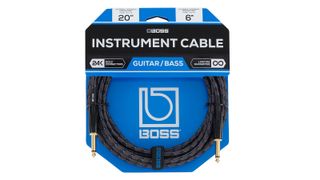
3. Boss Instrument Cable
Our expert review:
Specifications
Reasons to buy
Reasons to avoid
The Boss instrument cables offer a great blend of quality and affordability. They’re made from decent materials - as soon as you get your hands on it, you can feel quality straight away, and they don’t seem to take much away from your inherent tone.
They feature heavy duty framed shielding so you’re protected from unwanted microphonic noise, and the jacks feel really well connected to the cable. The material they’re made from also makes coiling them up after use really easy, so they’ll last a long time if looked after.
There’s a range of lengths depending on what you need, plus there are angled jack options too. From our experience, they're certainly one of the best guitar cables for the money, but if you want something super fancy, check out their premium range.
Also consider
Our top picks should have the vast majority of guitarists covered, but if you're looking for something more specific, you can check out some more great options below.
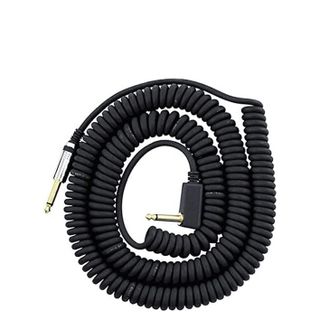
Connection: 1x 1/4" straight, 1x 1/4" right-angle jack
Length: 30ft (9m)
+ Epic vintage vibe
+ High quality cable
+ Great build quality
- Coiled cables look too funky
For those who want to harness the vintage-inspired aspects of their playing, there's arguably nothing more fitting than a killer coiled guitar cable from the folks at Vox. Although the look of these cables is next-level, they often get their fair share of flack from guitarists and so-called audiophiles, supposedly for their inferior sound quality. This cable from Vox proves those people wrong.
It's all down to the wire which Vox uses when putting together the Premium Vintage Coiled cable. It's made from 99.9% purity oxygen-free copper, which delivers a really tasteful, pronounced mid-range frequency which helps to provide the vintage vibe in droves. It's well built, even using two separate shields to improve strength and reduce extra noise and interference. Granted, the look does split opinion – but if you're a player with a vintage urge and want the look, then there's realistically nothing better.
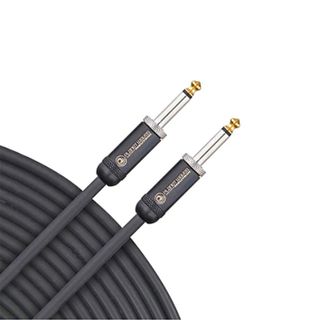
Features: 22 gauge oxygen-free copper twisted pair conductors, 95 percent tinned copper braid shielding, Geo-Tip plugs, approx 92pF/m capacitance
Connection: 1/4” straight-to-straight/-right-angle
Length: 10-30ft
+ Geo-Tip plugs for enhanced connection
+Low capacitance
- Lack of outer jacket options
- Not ideal if you want something premium
Planet Waves’ patented Geo-Tip plugs are a big draw with this best guitar cable entrant. They have a slightly flattened tip and longer shield, made by Neutrik in Liechtenstein to Planet Wave’s spec and no matter what jack is fitted in your guitar, these should fit nice and snug with no crackle or pop. That tinned-copper braid should stop rogue frequencies wrecking your signal too.
The HelioFused soldering is another feature unique to Planet Waves and this 180-degree inline connection helps make the American Stage a tough, durable and stage-ready cable. They are also affordable and available pretty much anywhere, with right-angled options.
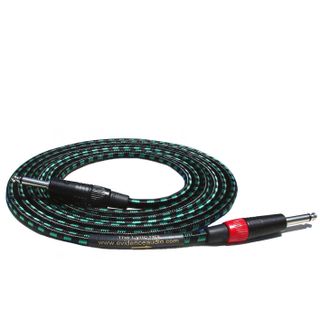
Features: dual solidcore made of refined IGL copper, braided copper shielding and a tough nylon/rubber outer
Connection: 1/4″ phone plug on the input side and a straight plug on the output
Length: 10-20-feet
+ Noticeably purer signal path
+ Incredibly robust
+ Expertly crafted
- Very expensive
There’s a good reason why David Gilmour, Jeff Beck and John Mayer all favor The Lyric – the design features a dual solidcore made of refined IGL copper, delivering a noticeably purer signal path and tone than a stock multi-strand cable. By the firm’s admission, the solid-core format means it’s a little stiffer, but with braided copper shielding and a tough nylon/rubber outer, it should be pleasuring your audience’s ears for years to come.
The main downside is the price. We know that the Lyric HG is an incredibly expensive option, but we found during testing that it actually is worth the money. The quality is second to none - and if it's good enough for John Mayer then we won't complain.
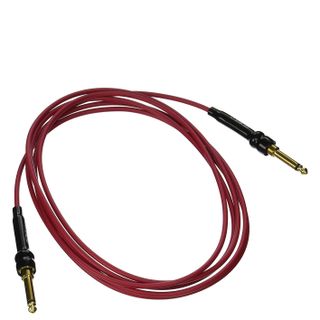
Features: Solder-less connection, George L’s .155 connectors, high-density braided shielding, 67pF/m capacitance
Connection: 1/4” straight-to-straight/-right-angle
Length: 10-20ft
+ Low capacitance
+ Lightweight and tough
- You want one of George’s build-your-own
- Thin cables are not everyone’s bag
George Lewis is famous for selling his .155 cable in bulk so that guitarists can take advantage of their solder-less connector design and build their own cable. His cables are also famous for their ultra-low capacity. Eric Johnson swears by them. You would be hard pushed to find another guitar cable on the market with a lower capacitance per meter. The frequency response is excellent and your signal is well shielded.
Readymade, these come out the box with George L’s solder-less .155 connections and despite the vintage feel of the low-diameter cable - and its tendency to coil a little - they feel like you could tow a trailer with them. For those who find the .155 too thin, the .255 offers an identical sonic performance but with thicker and heavier cable.
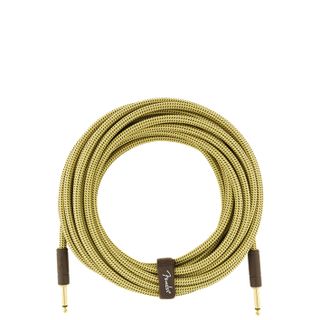
Features: 24K gold-plated connectors, 20 AWG 99.99 percent oxygen-free copper conductor, 95 percent braided oxygen-free copper shielding, molded plugs w/strain relief, yellow or black tweed outer jacket, hook-and-loop cable tie
Connection: 1/4” straight-to-straight/right-angle
Length: 5-25ft
+ Good value, lifetime warranty
+ Free cable tie
- You have money to burn
- Tweed ain’t your thing
Fender’s Deluxe Series might fly under the radar when it comes to guitar cables, but with a lifetime warranty and excellent construction they offer a high-performance product at a very competitive price. The custom-molded plugs have strain-relief in-built and make for a solid connection, while the Deluxe Series’ shielding holds its own against more expensive cables when it comes to killing extraneous noise.
They are a beefy 8mm diameter but coil nicely and come with a cable tie to encourage you to look after it. To our ears these are bright and transparent – the 10-foot cable especially – and certainly feel like a cable durable enough for the road. A worthy addition to our best guitar cables buyer's guide.
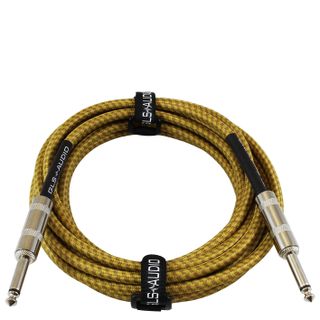
Features: Triple-strain relief, oxygen-free copper conductor, oxygen-free copper shielding, conductive PVC shield, plastic conductive carbon shield, approx 125pF/m capacitance, brown or black
Connection: 1/4” straight-to-straight/-right-angle
Length: 6-20ft
+ Low capacitance
+ Clear and bright tone
- If tweed ain’t your thing
The list price for these guitar cables at various lengths sits around 60 bucks so there is a whole lot to be saved from ordering from GLS direct. The tweed outer jacket looks great in black, impeccable in brown, and the feel of the GLS Audio Tweed is excellent; it coils nicely, is durable, and for the vintage enthusiast this might be too hard to resist.
The cable is double-shielded and low capacitance, so again it should be quiet enough without choking the high-end. There is no price difference between straight-to-straight and straight-to-right angle formats. During testing, we found that this GLS Audio cable delivers a thoroughly accurate and broad-sounding recreation of your tone. For around 60 bucks, the performance is impressive compared to other brands at that price.
How to look after your guitar cables
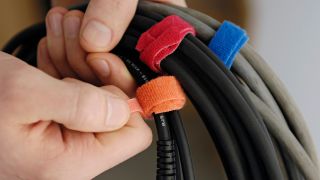
Taking good care of your cables is really important too - there’s no point spending a load of money on the best guitar cables, just to then treat them badly. Coil them properly when they’re not in use, and try to be wary of standing on them (not always easy when playing on small stages). Things like making sure your amp or pedalboard isn’t trapping them might seem an obvious step to take, but this has certainly led to the demise of many cables over time!
Here are some top tips from us that will ensure your cables stand the test of time:
1. Pull the plug
You can trust Guitar World
We mean this quite literally. Always pull from the plug itself and not the cable. Inside your guitar cable plug your cable is soldered to a connector, so pulling on the actual cable can weaken this joint and cause a failure.
2. Loop your cable
If you've ever watched pro guitarists play live, you might see they've looped their cable through their straps. It's not only a great way to prevent you from tripping on your cable, but also helps it last longer as you won't be treading on it whilst it's still plugged in, causing pressure on the connector. Another top tip is to loop the opposite end through the handle of your amp to prevent it from being pulled out accidentally.
3. Don't tread on me
If you can, try not to step on your guitar cables. When you're setting up, it's good to get in the practice of getting your amp, pedalboard, and guitar in the right place before you start plugging anything in.
4. The right angle
Right angled cables are really good for certain scenarios where you don't want loads of pressure on your cable. Think if your amp has its input jack on the top, a right angle cable will take a lot of the pressure off. Similarly, a right angle cable in your pedalboard can put any fears of someone treading on a cable to rest.
5. It's a wrap
Learning how to properly wrap your cables is a simple-to-learn skill that will stay with you forever, and ensure your cables accompany you too. Sound and studio engineers will love and respect you, and it helps keep everything organized in your rig. It'll speed up your setup process massively too, so taking the time to do this when you set down is absolutely worth the effort.
We won't go into exactly how to do it here, but there are plenty of online videos that show you the process.
FAQs
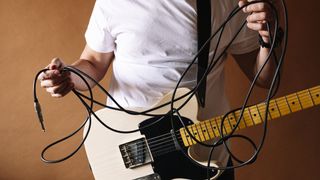
Do I need a different cable for acoustic, electric or bass guitar?
No, you don't need a specific type of cable for your different instruments - electric guitars, acoustic guitars and basses all use 1/4" jack connections, so any instrument cable will work. Now, just because there is no difference between the cable used for each instrument type doesn't mean you shouldn't pay close attention to which one you choose.
You'll want to consider whether an angled or straight jack would suit you better. Is the output jack located on the face of the guitar? In that case you'll want an angled cable. Likewise, many acoustic guitars are simply too bulky to take an angled connection, so the straight option would be a better choice.
How long should a guitar cable last?
The best guitar cables out there will be durable - if you look after them, you can expect to get a good number of years’ worth of use out of them, at least a couple of years plain sailing. When you pay more for a good quality lead, then it’s going to be well made, using quality parts. Things to look out for are the jack plugs and the material used for the actual cable part. Shielding around the core of the cable is good also, as this can help protect from unwanted noise when the cable is moved.
What is cable capacitance?
The cable can also have an affect on your tone. All cables have a certain capacitance - that is they hold a certain amount of electrical charge. As you might think, you don’t really want a cable to hold charge - you want your signal to flow through it, into your pedals and amp. In this scenario, a higher capacitance can cause a roll off of the higher end frequencies; so essentially you’ll hear less treble in your tone. So, low capacitance cables mean that you get a fuller frequency response. The difference might not be huge, but it’s there.
What length guitar cable do I need?
When looking for the best guitar cable, it’s also worth buying the shortest length that you can get away with. Like with high capacitance, longer cables can roll off some of your top end. Of course, it’s also worth thinking about the sound of your guitar and amp - you might perhaps want to lose some of those higher treble frequencies, though normally, shorter, low capacitance cables are the way to go.
How much should I spend on a guitar cable?
Like with many things in life, the more you pay, the better the product you end up with. Cheap budget cables can be alluring when you’re about to part with your cash, but, as the old saying goes - buy cheap, buy twice. Chances are, super budget cables will be noisy, will detract from your tone, and will break much sooner. The best guitar cables will keep the sound of your rig intact and will stand up to the rigours of everyday guitar playing.
What are guitar cables made of?
Different materials are used by various manufacturers, but copper is usually the core of the cable, and whilst you’ll see gold plated jack plugs on many premium cables, they don’t have much, if any affect on your tone, though they won’t corrode.
Are guitar cables balanced?
Guitar cables are unbalanced, which means they're very prone to outside interference and microphonic noise. It's partly why we recommend getting good quality cables, particularly where a complex pedalboard is in use.
Guitar leads are mono, sending one copy of your signal along it's length. Because they only send one signal, they pick extraneous noise along the way. A balanced cable sends two copies of your signal, with one inverted to cancel out the noise it picks up along the way.
Unfortunately as guitar players, we cannot use balanced cables as they are typically incompatible with the inputs on our guitar amplifiers. Our amps require a TS connector to work, whereas balanced cables carry a TRS connector.
You'd usually find balanced cables in use with other type of gear like synthesizers, studio monitors, PA systems, microphones, and many more. They're also recommended where you have a cable run of more than 25-feet.
Can guitar cables cause buzz?
This is a difficult one to answer because any component in your signal chain can cause buzz. Even electrical items around your setup can potentially cause buzzing, so while we wouldn't automatically point towards a guitar cable as the source of buzz - it might well be causing the issue.
The best way to detect the source of noise is to test each component individually. It takes time, but is pretty much the only way you'll get to the bottom of any unwanted noise. You may also need to section things off, as buzzing can build up over the course of a couple of pedals or cables.
Make sure to check any electrical items around where you play too - things like computer monitors or mobile phones - as these can cause unwanted buzzing in your signal chain
How we choose
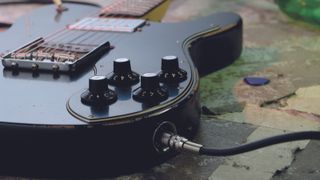
Unsurprisingly, everyone who writes here at Guitar World is a guitar player, so between us we've played a huge array of guitar cables. Whether it's gigging at a festival, taking things into a professional recording studio, or just turning up to weekly rehearsal, we're all looking for the very best in guitar tone.
For us, a great guitar cable has to cover a variety of tasks, but the sound is of the utmost importance. Cheap cables add noise to your signal, and nobody wants that, so our first test is to make sure that the cable is quiet, whether we're plugging directly into an audio interface or running our full gig rig with amp and pedalboard.
The next test a good guitar cable has to pass is one of durability. We'll take a cable to regular practice, tours, studio sessions, as well as using them at home to ensure they can withstand the pressure of constant use. We've got a lot of experience with guitar cables, so you can usually tell the quality of a cable straight off the bat, particularly when it comes to the part that's most likely to break, the connector.
Every guitarist likes a particular type of cable, so while there's no one-size-fits-all solution, we've got enough experience in the real world to recommend a guitar cable that will suit the vast majority of players out there. As guitar players ourselves we wouldn't recommend something we aren't comfortable using ourselves, so you can rely on our recommendations.
Find out more about how we make our recommendations, how we test each of the products in our buyer's guides and our review policy.
Related buyer's guide
- Tidy up your 'board with the best patch cables
- Explore the best gifts for guitar players
Get The Pick Newsletter
All the latest guitar news, interviews, lessons, reviews, deals and more, direct to your inbox!
After spending a decade in music retail, I’m now a freelance writer for Guitar World, MusicRadar, Guitar Player and Reverb, specialising in electric and acoustic guitars, bass, and almost anything else you can make a tune with. When my head’s not buried in the best of modern and vintage gear, I run a small company helping musicians with songwriting, production and performance, and I play bass in an alt-rock band.
- Matt McCrackenJunior Deals Writer
- James Farmer

